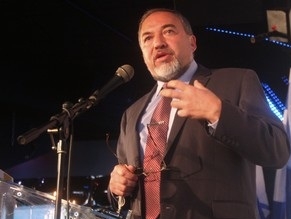|
World Jewish News

Former foreign minister Avigdor Liberman Photo: Flash 90
|
Liberman: Domestic issues first priority, diplomacy second
24.01.2013, Israel Domestic issues will be the main priority of the next government, Yisrael Beytenu leader Avigdor Liberman said Thursday morning ahead of the final election results.
In an interview with Israel Radio, Liberman said that a wide coalition would be the ultimate outcome of Prime Minister Binyamin Netanyahu's task to form a government. "There is no doubt that this is what Israel needs," he said.
He mentioned equalizing the burden of army service, improving conditions for the middle class and changing the government system, as goals shared by himself, Yesh Atid leader Yair Lapid and Bayit Yehudi leader Naftali Bennet, among others. However, he said, these parties do not share ideas on the diplomatic process. Therefore, he explained, in order for the next government to be an efficient one, it will be essential to focus on domestic issues. He added that the government could not simultaneously focus on domestic and diplomatic issues.
Questioned on the dormant Israeli-Palestinian peace process, Liberman said that Israel was prepared to meet with Palestinians for talks at any place and at any time. "We want to reach an agreement that will allow us to co-exist," he said... the fact that the other side doesn't want it and comes with its pre-conditions every time, that is their problem."
Addressing the issue of pressure from the international community over the peace process, Liberman listed Mali, Algeria, Syria, Pakistan, North Korea and Iran, and said: "I say to the world, you have so many challenges... you have enough to do."
Shas chairman Eli Yishai, meanwhile, told Army Radio that he was adamant that his party would not compromise on its core values, which include allowing yeshiva students to continue their studies in lieu of IDF service.
"We would never agree to the Plesner recommendations," Yishai said, referencing the Kadima party's unsuccessful 2012 attempt to resolve the issue of ultra-Orthodox enlistment. "It's not realistic to come and say we will draft everybody. The haredim will come as one and say 'we'll go to jail.'"
The issue will most likely put him at odds with both Lapid and Liberman, who are focused on altering the status quo on the issue.
Furthermore, Yishai added another caveat, saying that he would not bring his Shas party into the government unless Arye Deri was given a ministerial portfolio. Deri served jail time for taking bribes during his tenure as interior minister, and has drawn the ire of Netanyahu for harsh criticism levied against the prime minister during elections.
That said, Yishai said he would sit with Netanyahu for coalition talks in the near future, and expressed confidence that his party would sit once again in government. "Netanyahu told me that he was interested in forming a coalition with his 'natural (haredi) partners,'" he said, hinting that such a deal would be an issue of "meetings and hours."
Yesh Atid's Shai Moshe Piron, number two on the party list, reiterated his party's claim that it would not join a coalition unless it focused on the party's three core issues. "First and foremost, the government must work towards equalizing the burden of IDF service," he told Army Radio. "Second, we must return to negotiations with the Palestinians. And third, we must reform the electoral system."
He said that Lapid will meet Netanyahu next week for coalition talks.
Future MK Ofer Shelah - number six on the Yest Atid list - echoed Piron's comments in an interview with Israel Radio. Shelah asserted that Yesh Atid will stand by its demand for negotiations with the Palestinians to reach an agreement and will not be satisfied by empty talk.
"A diplomatic settlement is essential," he stressed. He added that the party would also demand that the government equalize the burden by passing a law within five years that will require all 18-year-old to serve the state through military or civilian service.
Shelah also explained that Yesh Atid leader Yair Lapid refused Labor's call to try to form an "obstructing bloc" with the left-wing parties, because he said there is no chance that they could form a government with this bloc.
Barak comments on Israeli elections
Outgoing Defense Minister Ehud Barak on Wednesday characterized the Israeli elections as a victory for the social justice movement, which he admitted had been long ignored by the government he was a part of.
Speaking to CNN, Barak said "I think that what we call the social protest - the people who went in hundreds of thousands to the streets last year, and were basically ignored by the government, which I am a part of - they came to the envelopes to say, for us, we want our share of what happens to Israel. It was telling the government: There is a limit to what you can expect of us."
Barak said that traditional right-wing voters did not have the same enthusiasm in this election as did the Left. The Center and Left voted "en masse," he said.
Asked to predict the orientation of a future coalition, the minister said it would be led by Netanyahu but would be more balanced and would take into account issues of mainstream Israelis.
Barak recalled an oft-told Israeli anecdote which speaks to the Israeli middle class's frustration with a political system which has seen ultra-Orthodox largely shirk public responsibility such as IDF service. "One third is waking up to work, one third is paying taxes, one third is serving in the reserve armed forces. But it's the same one third."
JPost.com
|
|
